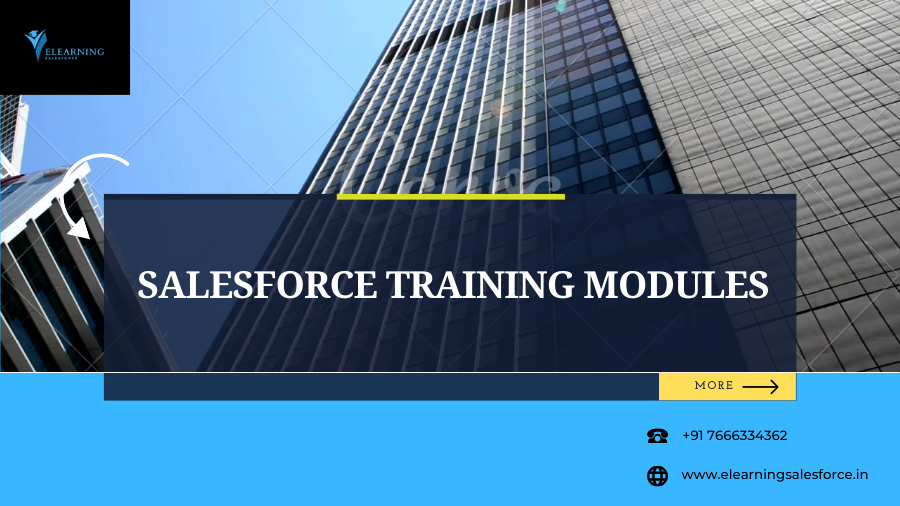Salesforce is one of the most popular customer relationship management (CRM) software applications in the world. It is used by businesses of all sizes to manage their customer interactions, sales processes, and marketing campaigns. Salesforce offers a wide range of training modules that are designed to help businesses and individuals learn how to use the software effectively. In this blog post, we will explore some of the key Salesforce training modules.
Salesforce training modules and how they can benefit you
Salesforce Administrator Training is designed for individuals who want to learn how to manage and configure Salesforce. This training module covers topics such as user management, security, automation, data management, and reporting. The course is suitable for individuals who are new to Salesforce or who have some experience but want to improve their skills.
The training is delivered through a combination of online tutorials, videos, and hands-on exercises. It is designed to be self-paced, so you can learn at your own speed. Once you complete the training, you will have the skills and knowledge to manage your organization’s Salesforce instance effectively.
Salesforce Developer Training is designed for individuals who want to learn how to develop custom applications on the Salesforce platform. The training covers topics such as Apex, Visualforce, and Lightning Components. It is suitable for individuals who have some programming experience and want to learn how to develop on the Salesforce platform.
The training is delivered through a combination of online tutorials, videos, and hands-on exercises. It is designed to be self-paced, so you can learn at your own speed. Once you complete the training, you will have the skills and knowledge to develop custom applications on the Salesforce platform.
- Salesforce Sales Cloud Training
Salesforce Sales Cloud Training is designed for sales professionals who want to learn how to use Salesforce to manage their sales process. The training covers topics such as lead management, opportunity management, forecasting, and collaboration. It is suitable for individuals who are new to Salesforce or who have some experience but want to improve their sales skills.
The training is delivered through a combination of online tutorials, videos, and hands-on exercises. It is designed to be self-paced, so you can learn at your own speed. Once you complete the training, you will have the skills and knowledge to manage your sales process effectively.
Salesforce Service Cloud Training is designed for customer service professionals who want to learn how to use Salesforce to manage their customer interactions. The training covers topics such as case management, knowledge management, and customer collaboration. It is suitable for individuals who are new to Salesforce or who have some experience but want to improve their customer service skills.
The training is delivered through a combination of online tutorials, videos, and hands-on exercises. It is designed to be self-paced, so you can learn at your own speed. Once you complete the training, you will have the skills and knowledge to manage your customer interactions effectively.
Salesforce Marketing Cloud Training is designed for marketing professionals who want to learn how to use Salesforce to manage their marketing campaigns. The training covers topics such as email marketing, mobile marketing, social media marketing, and marketing automation. It is suitable for individuals who are new to Salesforce or who have some experience but want to improve their marketing skills.
The training is delivered through a combination of online tutorials, videos, and hands-on exercises. It is designed to be self-paced, so you can learn at your own speed. Once you complete the training, you will have the skills and knowledge to manage your marketing campaigns effectively.
In conclusion, Salesforce offers a wide range of training modules that are designed to help businesses and individuals learn how to use the software effectively. Whether you are a sales professional, a customer service professional, a marketer, a developer, or an administrator, there is a Salesforce training module that can help you improve your skills. These training modules are delivered through a combination of online tutorials, videos, and hands-on exercises, and they are designed to be self-paced, so you can learn at your own speed.
By completing Salesforce training modules, you can gain valuable skills and knowledge that can help you improve your job performance, advance your career, and increase your earning potential. In addition, Salesforce certification is available for individuals who want to demonstrate their proficiency in using the software. Salesforce certification can be a valuable asset for job seekers and can help individuals stand out in a competitive job market.
Overall, Salesforce training modules can be an excellent investment for businesses and individuals who want to improve their Salesforce skills. Whether you are new to Salesforce or have some experience, these training modules can help you gain the knowledge and skills you need to succeed. With the right training, you can become a more effective Salesforce user, advance your career, and achieve your professional goals.
What are the basic skills in Salesforce?
Basic skills in Salesforce generally revolve around understanding the core concepts and functionalities of the platform. Here are some fundamental skills that are important for anyone starting with Salesforce:
- Navigating the Interface: Familiarize yourself with the Salesforce user interface, including how to access different tabs, objects, and records.
- Data Model: Understand the basics of Salesforce’s data model, which includes objects (standard and custom), fields, records, and relationships between objects.
- Record Creation and Management: Learn how to create, edit, and delete records within Salesforce. Understand different record types and how they affect data entry.
- User Management: Learn to create and manage user accounts, assign profiles, and set up permission sets to control access to different parts of Salesforce.
- Basic Reporting: Explore how to create and run basic reports to retrieve information from your Salesforce data. Understand report types, filters, and customization options.
- Data Import and Export: Gain knowledge of how to import and export data using tools like Data Import Wizard and Data Loader.
- Workflow and Automation: Understand the concept of workflow rules and how to automate simple business processes using them.
- Security and Sharing: Learn about the security model in Salesforce, including roles, profiles, and sharing settings that control data access.
- Basic Customization: Explore basic customization options like creating custom fields, page layouts, and list views to tailor the platform to your organization’s needs.
- Communication and Collaboration: Understand how to use Chatter, Salesforce’s internal social collaboration tool, to communicate with colleagues and collaborate on records.
- Trailhead: Get acquainted with Salesforce’s Trailhead platform, which offers interactive, guided learning paths for various Salesforce roles and features.
- Documentation and Help Resources: Learn how to use Salesforce’s official documentation, community forums, and support resources to find answers to your questions.
Remember that Salesforce offers a wide range of functionalities, and these basic skills provide a foundation upon which you can build more advanced knowledge. As you become more comfortable with these basics, you can gradually explore more complex topics like automation using Process Builder, Apex coding, Lightning components, advanced reporting, and integrations with other systems.
If you’re considering a career in Salesforce, it’s a good idea to identify the specific role you’re interested in (e.g., administrator, developer, consultant) and tailor your learning journey accordingly. Salesforce provides role-specific certification tracks that can guide your skill development and help you validate your expertise.
conclusion
In conclusion, Salesforce training modules provide an effective way to learn and master the platform’s functionalities. Whether you’re aiming to become an administrator, developer, consultant, or simply enhance your understanding of customer relationship management, these modules can offer valuable insights and skills. It’s important to choose modules that align with your goals and learning preferences, and to complement your training with hands-on practice and engagement with the Salesforce community.



